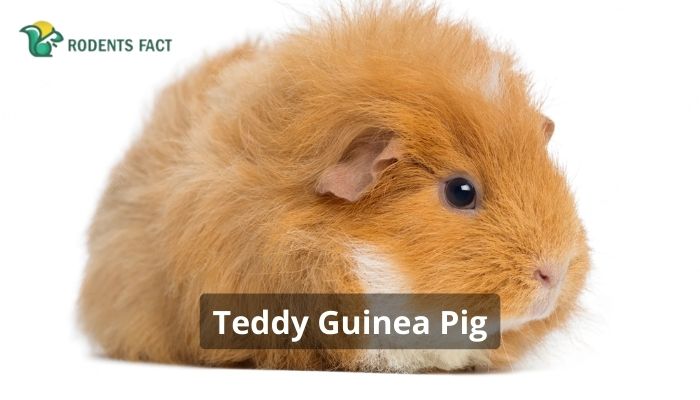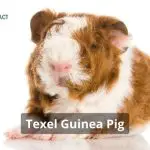Teddy Guinea Pig: Fact, Personality, Health Issues, and Caring
Guinea pigs are big rodents without tails with multicolored hair. Because of their coarse, short hair, Teddy Guinea Pigs do not need much care.
A teddy guinea pig has a lot of energy, yet they do not go overboard. Cuddly, loving, and social, these creatures are a joy to be around. They live 7 to 11 years and weigh 3.5 pounds when they mature.

For the most part, they are gentle and friendly little creatures. They need a little attention, but it is easy to provide it to them. Their homes are simple to set up, and most pet shops should carry the food they need.
What is a Teddy Guinea Pig?
Teddy Bear guinea pigs are newer kinds. The Teddy is significantly unique from its American counterpart with a smooth coat. Short, thick hair rises straight up on their heads. If you look closely, it resembles a plush bottle brush!

Teddy Bear guinea pigs have a much wider, slightly raised nose known as a “Roman nose” than ordinary cavies.
Facts on Teddy Guinea Pigs
These are some of the facts on Teddy Guinea Pig
| Species Name | Cavia Porcellus |
| Family | Cavies |
| Care Level | Medium |
| Temperature | Warm/Humid |
| Temperament | Friendly, affectionate, social, needy |
| Color Form | Black, cream, gold, lilac, beige, brindle |
| Lifespan | 7 to 11 years |
| Size | 10 to 12 inches and 1 to 3.5 pounds |
| Diet | Hay, vegetables, herbs |
| Minimum Tank Size | 8 square feet per animal |
| Tank Setup | Bedding, toys, hideouts, food, water |
| Compatibility | Yes, with each other |

Where Does The Teddy Guinea Pig Come From?
The Inca domesticated Guinea pigs 3000 years ago in the Andes Mountains. They were traditionally maintained and grown as a food source and a sacrifice to the deities.
The Spanish are said to have imported guinea pigs to Europe, where they became well-liked pets.
In modern times, they have been both pets and lab study subjects. Their participation in the lab may have resulted in the development of this specific breed of cavy.
The Teddy Guinea Pig Appearance
The Teddy guinea pig is the same size and form as any other guinea pig. Two wiggly years go along with their cylinder-shaped frame, four legs, and four toes.

Although its face is similar to a Teddy Bear’s, one significant visual difference is its nose. It is known as a “Roman nose” because it is so much broader than those of other breeds.
Teddy Guinea Pig Size
What is the maximum size of a Teddy Bear Guinea Pig? The average length of a teddy bear is around 12 inches.
It is common for guinea pig females to weigh between 1.5 and 2.5 pounds, somewhat smaller than the males. The average weight of a male Teddy bear is from 2 to 3 pounds.
There are exceptions to the norm, just as there are with every other kind of pet.
Teddy Guinea Pig Colors
It is possible to find Teddy Guinea Pigs in all hues and patterns, from solids to roans to various colors, including tricolors. This ranges from pristine white to jet black, glossy brown, chestnut, and gold to grey.
Satin coats for teddy guinea pigs are shinier than regular coats. The American Cavy Breeders’ Association website has a few samples of Teddy guinea pig colors.
The Teddy Guinea Pigs’ Personality
The Teddy guinea pig, like its namesake, enjoys being caressed and held close to one’s chest. However, like other guinea pig varieties, you should always treat your pet cautiously.

Your pet’s safety is at stake if you do not know how to lift and handle it correctly.
Also, do not leave little children or anyone with little or no expertise with your cavies. Despite their resemblance to a solid potato, guinea pigs are susceptible to injury and stress.
Your piggy may get angry if you drop it, handle it harshly or hold it for too long.
As with other cavies, Teddy will do best in a group setting with at least two different animals. A friendly disposition implies they get along with dogs and cats.
Only supervised play dates are recommended for the sake of your pet’s safety and your peace of mind. If you are going to work or cannot maintain a close check on your pets, ensure they are securely secured in their cage, apart from other pets.
Teddy Guinea Pig Temperament
Teddies are incredibly social and like spending time with humans and the other animals in their enclosure.

Gently handling them is a favorite pastime of theirs. As a result, they are a popular choice for children’s pets.
A little patience and persistence are all it takes to teach a teddy bear basic instructions and tricks.
Always keep your Teddies in couples or small groups so they can play with each other.
Teddies get along quite well with different guinea pig breeds.
However laid-back they are, Teddies need a lot of room to run about and play to be happy.
Health Issues of Teddy Guinea Pigs
The average lifespan of a Teddy Guinea pig is 4 to 8 years. However, some have reached the age of eleven. Small rodents, including Teddy Guinea pigs, are vulnerable to respiratory infections caused by bacteria or viruses.

Dirty environments, stress, or any combination of the two are frequently to blame. See a vet if your guinea pig’s eyes or nose have a discharge, sneezes, or trouble breathing. It is also essential to keep an eye out for the following:
Teddy Guinea pigs are susceptible to ear infections, which need frequent ear cleaning. A strong odor from their ears and a head tilting are also signs of disease.
If you compare the Teddy Guinea Pig breed with others, you may see that it is more prone to having dry skin problems. Using a shampoo mainly designed for them is a must since they should only be washed three times a year. Ringworm is one of the skin parasites they are susceptible to.
A disorder is known as “bumblefoot” affects pigs’ feet. Preventing cages with a wire bottom is the most critical factor. Teddy Guinea pigs that suffer from this health issue may have difficulty moving around.
Low levels of vitamin C may lead to Scurvy. Guinea pigs may get all the necessary vitamins if fed a specially formulated pellet diet. Scurvy is characterized by a poor coat condition, a reduced appetite, diarrhea, and pain while moving.
Guinea pigs often have UTIs and bladder stones. The sooner you get them to the vet if you see any of these symptoms, the better.
How to Care for a Teddy Guinea Pig
Teddy Guinea pigs need daily and weekly care, although it is not difficult. Those with a hectic schedule or a tiny apartment may enjoy the company of an animal because they are so easy to take care of.

Teddy Guinea Pig Cage Choosing
The ideal option for a Teddy Guinea pig is a wire cage, but make sure that the bottom of the cage is not constructed of wire. This is essential for the safety of the pigs’ feet.
One Guinea pig’s cage should be at least 7 1/2 square feet, while it is preferable to have a bigger one. Remember that many cages are too tiny, even if they say otherwise on the label. Try to obtain the largest cage that will fit in your living area.
The Humane Society of the United States suggests the following minimal requirements:
- 30- by 50-inches for two Guinea pigs
- 30- by 62-inches for three Guinea pigs
- 30- by 76-inches for four Guinea pigs
Regular cleaning is necessary to maintain a clean and hygienic cage. Many people use Scented bedding like CareFresh for their Guinea pigs, but fleece, which can be removed, cleaned, and re-used, is also popular.
Teddy Guinea Pig Diet
Teddy Guinea pigs need high-quality pelleted food. Vitamin C-fortified foods are best. Their digestive systems require Timothy hay to chew on.
Supplement their diet with snacks. This may contain chopped lettuce, carrots, and green peppers.
Ensure your pig has a constant fresh water supply in a drinking container. They can also receive a chopped apple, blueberry, banana, orange, or strawberry.
Let’s have some visualization on teddy guinea pigs.
Frequently Asked Questions
1. Are Teddy Guinea Pigs Friendly?
Teddy guinea pigs have short, coarse hair that requires little care. They are smaller and friendlier than the significant species.
2. Are Teddy Guinea Pigs Rare?
The Teddy Guinea pig is an easy breed to get by if your heart is set on having one. Expect to spend $25 to $30. Colors and patterns cost extra.
3. How Long Do Teddy Guinea Pigs Live?
Teddy bear guinea pigs cost extra and are smaller than typical. In optimal circumstances, a teddy bear may live for seven years.
4. Do Teddy Guinea Pigs Smell?
Clean your pet’s cage to reduce the stink. Like your house, the guinea pig’s living quarters will smell if mistreated. Every week, clean your guinea pig’s cage and wash it to minimize odors.
Final Words
For a little pet that does not demand a lot of attention and can live comfortably in a small apartment, the teddy guinea pig is a great option. A person of any age may enjoy spending time with this squishy pet.
Make sure they have an adequate-sized cage and acquire at least two, so they do not become lonely or anxious while you are gone.




